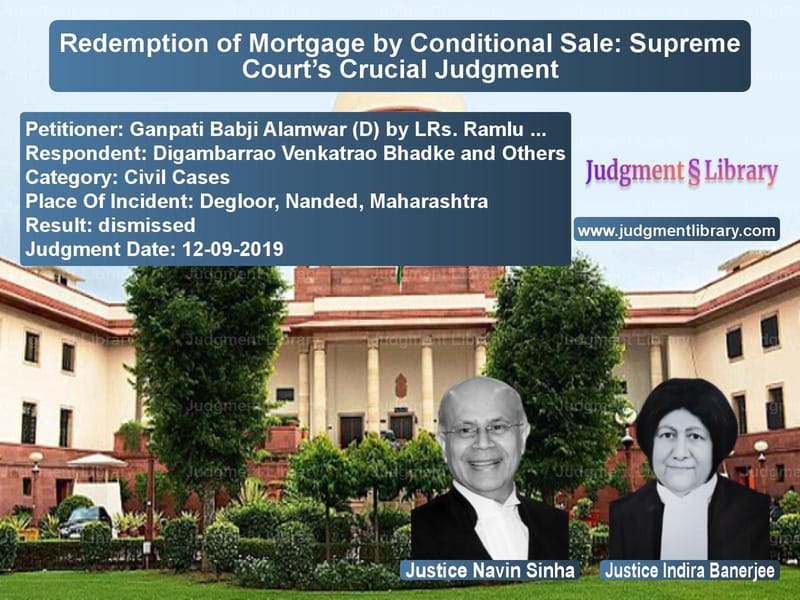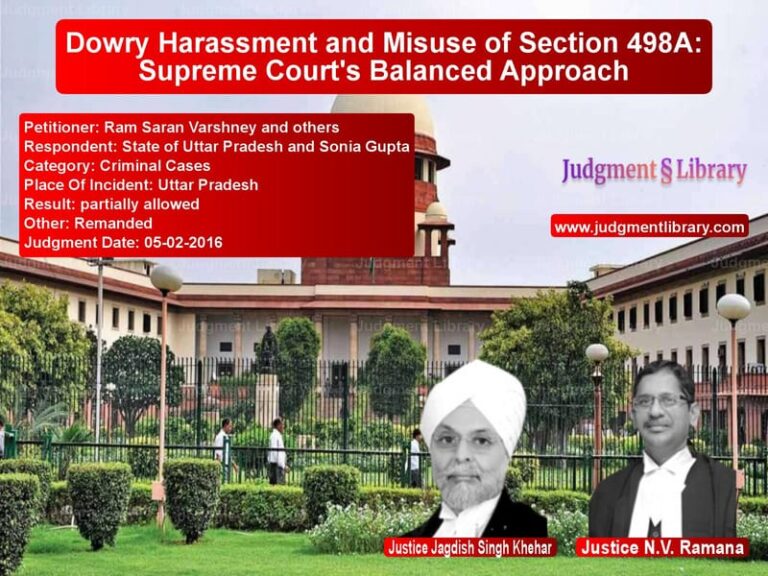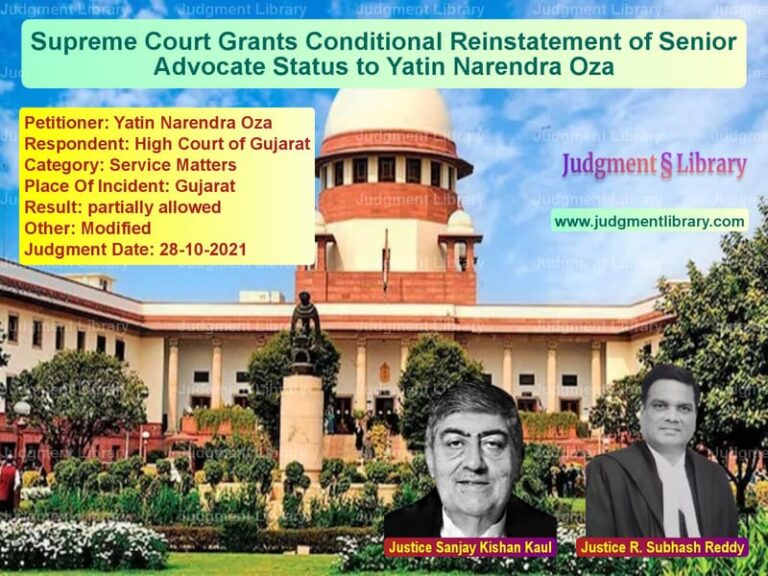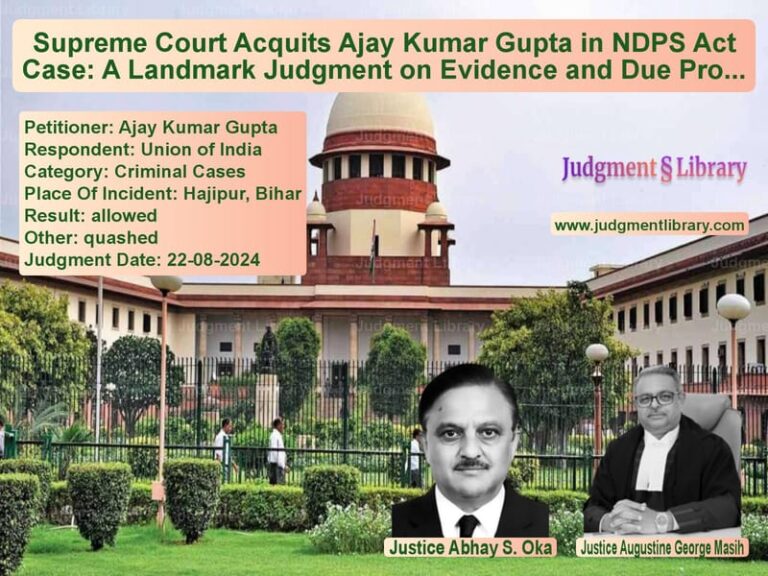Redemption of Mortgage by Conditional Sale: Supreme Court’s Crucial Judgment
The Supreme Court of India recently ruled on an important legal issue concerning the redemption of mortgages by conditional sale under Section 58(c) of the Transfer of Property Act, 1882. The case involved a dispute over whether an agreement constituted a mortgage by conditional sale or an outright sale with a repurchase clause. The appellants, Ganpati Babji Alamwar and others, challenged the High Court’s decision, which had ruled in favor of the respondents, affirming their right to redeem the mortgage.
The primary question before the Supreme Court was whether the transaction in question constituted a mortgage or a sale with an option to repurchase, a distinction that has long been a source of legal debate.
Background of the Case
The dispute revolved around agricultural land in Degloor, Nanded, Maharashtra. The plaintiffs (respondents in the Supreme Court) had purchased goods on credit from the appellant, leading to an outstanding debt of Rs. 10,500. To settle this debt, they executed an installment bond, agreeing to repay the amount in three installments. However, when they failed to make the first payment, they executed a conditional sale deed on April 29, 1971, transferring their agricultural land to the appellant in exchange for Rs. 11,000.
The agreement included a clause that allowed the respondents to repurchase the land by repaying the amount within two years, failing which the sale would become absolute. Since the respondents did not repay the debt within the stipulated period, the appellant obtained a mutation of the land in his favor and later sold it to a third party. The respondents then filed a suit for redemption of the mortgage in 1980, arguing that the transaction was a mortgage by conditional sale and not an outright sale.
Arguments of the Appellants
The appellants, represented by their legal counsel, made the following arguments:
- The agreement in question was a sale deed, not a mortgage, as it transferred ownership and possession of the land to the appellant.
- The respondents had failed to repay the debt within the agreed-upon time, and therefore, the sale had become absolute.
- The respondents did not object to the mutation of the land, indicating that they had accepted the sale as final.
- The redemption suit was filed seven years after the expiration of the deadline, and such a delay should not be condoned.
- The transaction was not undervalued, and the appellant was a bona fide purchaser.
Arguments of the Respondents
The respondents, represented by their legal counsel, countered with the following arguments:
- The agreement was not an outright sale but a mortgage by conditional sale, as it included a clause for repurchase.
- There existed a debtor-creditor relationship between the parties, which is a key characteristic of a mortgage.
- Under Section 58(c) of the Transfer of Property Act, a mortgage by conditional sale occurs when the transfer of ownership is contingent on repayment of the loan.
- The limitation period for redeeming a mortgage is 30 years, and therefore, the suit was filed within the permissible timeframe.
- The mutation of the land three years after the expiration of the repayment period was not sufficient to alter the legal nature of the agreement.
Supreme Court’s Analysis
The Supreme Court examined the nature of the agreement in light of Section 58(c) of the Transfer of Property Act, which defines a mortgage by conditional sale as follows:
“Where the mortgagor ostensibly sells the mortgaged property on condition that on default of payment of the mortgage-money on a certain date the sale shall become absolute, or on condition that on such payment being made the sale shall become void, or on condition that on such payment being made the buyer shall transfer the property to the seller, the transaction is called a mortgage by conditional sale.”
The Court emphasized that the key factor in determining whether a transaction is a mortgage or a sale is the intention of the parties, which must be inferred from the language of the document, the relationship between the parties, and the surrounding circumstances.
The Court made the following key observations:
- The agreement contained a clause for repurchase, which is a strong indication that the transaction was a mortgage by conditional sale rather than an outright sale.
- The existence of a debtor-creditor relationship was evident, as the agreement was executed to settle an outstanding debt.
- Under Article 61(a) of the Limitation Act, 1963, a mortgagor has 30 years to redeem a mortgage, and therefore, the suit was filed within the permissible timeframe.
- The financial distress of the respondents was a crucial factor in determining the nature of the agreement. An agriculturist would not ordinarily sell land merely to settle a small credit debt.
- The mutation of the land in the appellant’s name three years after the deadline did not negate the mortgage nature of the transaction.
The Court relied on past rulings, including Bhaskar Waman Joshi v. Shrinarayan Rambilas Agarwal (AIR 1960 SC 301), which stated that the real character of a transaction must be determined from the surrounding circumstances and the conduct of the parties.
Final Judgment
The Supreme Court ruled in favor of the respondents, affirming their right to redeem the mortgage. The Court held:
“The agreement dated April 29, 1971, was a mortgage by conditional sale, and therefore, the respondents are entitled to redeem the property. The suit for redemption was filed within the period of limitation, and the appellants cannot claim absolute ownership over the property.”
With this ruling, the Supreme Court reaffirmed the principles governing mortgages by conditional sale and ensured that property rights were protected against unfair transactions.
Petitioner Name: Ganpati Babji Alamwar (D) by LRs. Ramlu and Others.Respondent Name: Digambarrao Venkatrao Bhadke and Others.Judgment By: Justice Navin Sinha, Justice Indira Banerjee.Place Of Incident: Degloor, Nanded, Maharashtra.Judgment Date: 12-09-2019.
Don’t miss out on the full details! Download the complete judgment in PDF format below and gain valuable insights instantly!
Download Judgment: Ganpati Babji Alamwa vs Digambarrao Venkatra Supreme Court of India Judgment Dated 12-09-2019.pdf
Direct Downlaod Judgment: Direct downlaod this Judgment
See all petitions in Property Disputes
See all petitions in Succession and Wills
See all petitions in Judgment by Navin Sinha
See all petitions in Judgment by Indira Banerjee
See all petitions in dismissed
See all petitions in supreme court of India judgments September 2019
See all petitions in 2019 judgments
See all posts in Civil Cases Category
See all allowed petitions in Civil Cases Category
See all Dismissed petitions in Civil Cases Category
See all partially allowed petitions in Civil Cases Category







